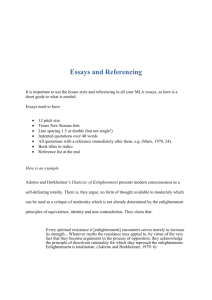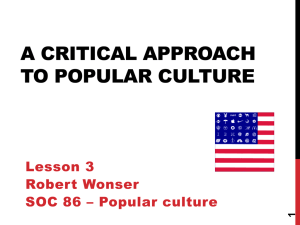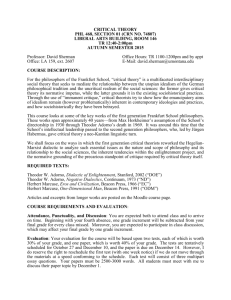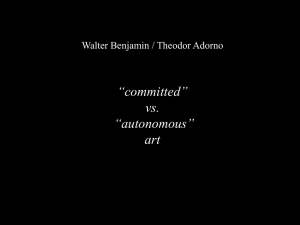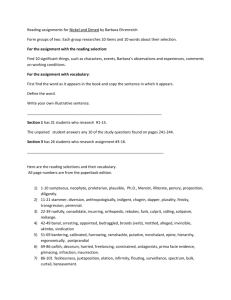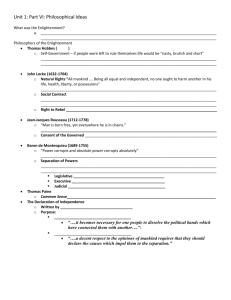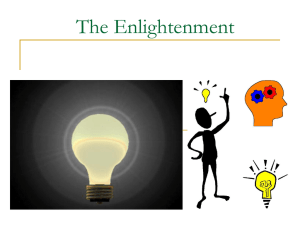lecture notes - University of Warwick
advertisement
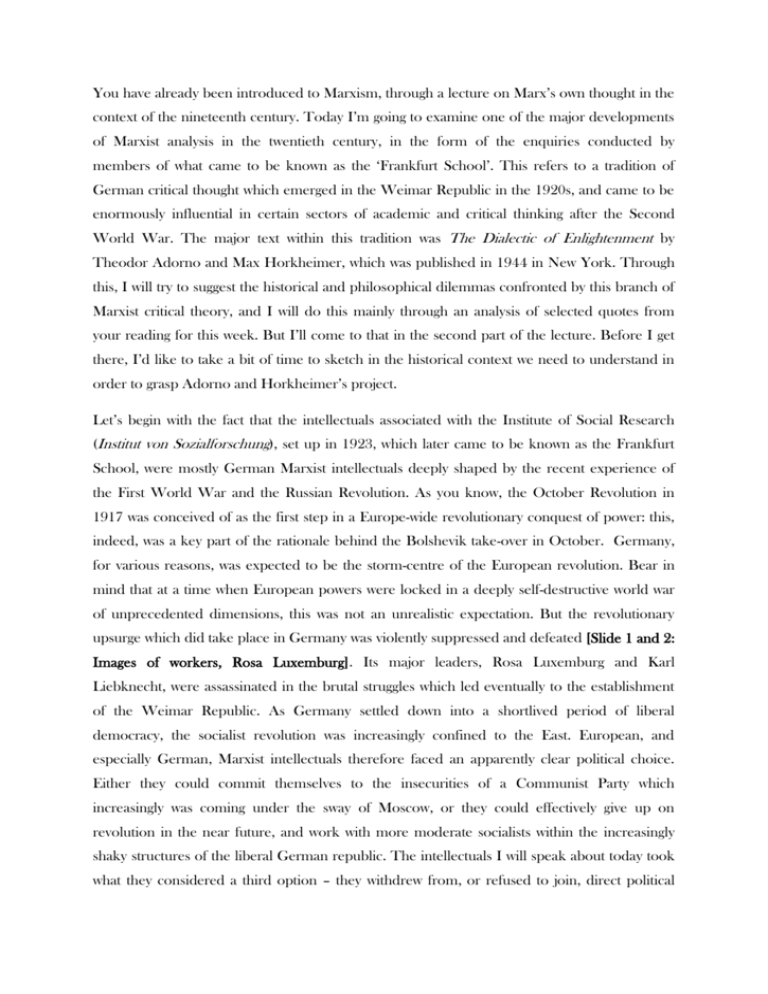
You have already been introduced to Marxism, through a lecture on Marx’s own thought in the context of the nineteenth century. Today I’m going to examine one of the major developments of Marxist analysis in the twentieth century, in the form of the enquiries conducted by members of what came to be known as the ‘Frankfurt School’. This refers to a tradition of German critical thought which emerged in the Weimar Republic in the 1920s, and came to be enormously influential in certain sectors of academic and critical thinking after the Second World War. The major text within this tradition was The Dialectic of Enlightenment by Theodor Adorno and Max Horkheimer, which was published in 1944 in New York. Through this, I will try to suggest the historical and philosophical dilemmas confronted by this branch of Marxist critical theory, and I will do this mainly through an analysis of selected quotes from your reading for this week. But I’ll come to that in the second part of the lecture. Before I get there, I’d like to take a bit of time to sketch in the historical context we need to understand in order to grasp Adorno and Horkheimer’s project. Let’s begin with the fact that the intellectuals associated with the Institute of Social Research (Institut von Sozialforschung), set up in 1923, which later came to be known as the Frankfurt School, were mostly German Marxist intellectuals deeply shaped by the recent experience of the First World War and the Russian Revolution. As you know, the October Revolution in 1917 was conceived of as the first step in a Europe-wide revolutionary conquest of power: this, indeed, was a key part of the rationale behind the Bolshevik take-over in October. Germany, for various reasons, was expected to be the storm-centre of the European revolution. Bear in mind that at a time when European powers were locked in a deeply self-destructive world war of unprecedented dimensions, this was not an unrealistic expectation. But the revolutionary upsurge which did take place in Germany was violently suppressed and defeated [Slide 1 and 2: Images of workers, Rosa Luxemburg]. Its major leaders, Rosa Luxemburg and Karl Liebknecht, were assassinated in the brutal struggles which led eventually to the establishment of the Weimar Republic. As Germany settled down into a shortlived period of liberal democracy, the socialist revolution was increasingly confined to the East. European, and especially German, Marxist intellectuals therefore faced an apparently clear political choice. Either they could commit themselves to the insecurities of a Communist Party which increasingly was coming under the sway of Moscow, or they could effectively give up on revolution in the near future, and work with more moderate socialists within the increasingly shaky structures of the liberal German republic. The intellectuals I will speak about today took what they considered a third option – they withdrew from, or refused to join, direct political engagement, and concentrated on the development of Marxist thought. This marked a new departure: previously, Marxist theory itself had mainly been a product of labour and socialist movements, and had, since Marx, chiefly discussed the possibilities of socialist change and revolutionary politics. Now, the production of Marxist theory itself began to move into what we might broadly consider the ‘academy’ – not so much in the sense of the university, as in the sense of scholarly circles, independently funded research institutes, and the world of academic journals and publications. Simultaneously, the scope of Marxist research broadened: no longer focused primarily on questions of revolution and political change, Marxists began to undertake sociological, psychoanalytic, historical, philosophical and aesthetic studies with greater intensity. No single institution embodied this shift more starkly than the Frankfurt School. German Marxists felt the need to set up an independent institute for two chief reasons. First, the orthodoxy of ‘official’ Marxism was bolstered by the Bolshevik Revolution, and independent Marxists not necessarily wedded to the Soviet cause found little support as the 1920s wore on from that quarter. Towards the end of the 1920s, with the rise of Stalin, the Soviet Union began to clamp down on academic freedom and research, and the effects were felt by many Marxists who held independent opinions about the Russian Revolution, or about the subjects on which Stalin laid down a dictatorial intellectual line. Second, and more immediately, Marxist research was not a safe subject to pursue within the German academic establishment: universities discriminated systematically against left-wing scholarship and teaching. There was no room, for instance, for left-wing subjects like histories of the German working class. The German academic establishment was also conservative in intellectual terms: it frowned upon more imaginative, cross-disciplinary forms of research, and kept disciplines like history, sociology and philosophy rigidly demarcated. Yet Marxist inquiry required precisely such cross-disciplinary fertilization. So it was that in 1923, Felix Weil, a young Marxist from a wealthy family, used some of the money from his father’s fortune in the grain trade to establish an independent institute in Frankfurt. [Slide 3: image of Weil] The first director of the Institute was Carl Gruenberg [Slide 4: photograph of Gruenberg], a rare instance of a Marxist with a tenured professorial job, at Frankfurt University. Gruenberg was a historian of the labour movement, and an orthodox Marxist who kept the Frankfurt School distant from theoretical innovations till 1930, when he stepped down. He was replaced by Max Horkheimer [Slide 5: Horkheimer], who played a major role in shifting the direction of intellectual inquiry at the Institute. At a purely scholarly level, Horkheimer disliked the massive tomes which characterized German scholarship at the time. He preferred conciseness and brevity. Scholars at the Institute tended to write essays, sometimes long ones which stretched into modest-sized books. Before publication, they were collectively discussed and critiqued by other members of the Institute: thus, publications by members were conceived of as collaborative undertakings. Horkheimer also established a journal, the Zeitschrift fur Sozialforschung, or the Journal of Social Research. [Slide 6: Journal] Horkheimer made two major changes in the organization of scholarship at the Institute. First, he insisted on a social science which was critically aware of its own role in the world, rather than seeking a pure form of truth independent of social and historical context. Second, he insisted on interdisciplinarity. The Frankfurt School thus included philosophers, cultural critics, sociologists and psychoanalysts who tried to develop arguments which integrated these different disciplines. From your reading of Dialectic of Enlightenment for this week, you will already have noticed how difficult it is to slot it into a disciplinary category. Horkheimer was critical of the stultification of Marxist thought in Germany, which he felt had come out of an over-direct link with political work and agitation. So, in the first place, he refused to confine the membership of the Frankfurt School to card-carrying Marxists alone. In the 1930s and beyond, the Frankfurt School would become genuinely cross-disciplinary, and while the development of Marxist thought would remain a priority, there was a conscious attempt to try and accomplish this without introducing sectarian quarrels into scholarship. So along with a strong core of Marxist intellectuals, the Frankfurt School also included intellectuals of broadly left-wing persuasion who were not Marxist, such as the great cultural theorist Siegfried Kracauer, or Marxist in an extremely unorthodox fashion, such as Walter Benjamin, one of the major cultural critics and philosophers of the twentieth century. Horkheimer was also critical of developments in the Soviet Union, along with many fellow-Marxists. In the early 1930s, they maintained a studied silence about the Soviet Union, in contrast to the outpouring of enthusiasm in other Marxist circles. In the late 1930s, in the context of Stalin’s show trials and executions of thousands of Communists, some European Marxists, including those associated with the Frankfurt School, would adopt a more openly critical posture. Horkheimer and his close associate Adorno were among those Marxist intellectuals for whom the experience of the Soviet Union meant a painful realization that Marxist optimism about the shape of the future was ill-founded. More immediately than the distortions of socialism in Soviet Russia, however, the Frankfurt School, under Horkheimer’s directorship, had to face fateful events in Germany. The rise of the Nazis made the presence of a Marxist institute in Germany untenable, as democrats, socialists and communists alike were forced to flee from their country, and often from Europe itself. For members of the Frankfurt School, whether Marxist or non-Marxist, the problem was made more intense by the heavy presence of Jewish intellectuals at the institute. Theodor Adorno, Herbert Marcuse, and Walter Benjamin – who are remembered today as the three leading figures of this intellectual movement, were all Jewish. Horkheimer was quick to realize the dangers in the early 1930s for a left-wing institute, and the Frankfurt School was relocated to the United States. So the thinkers associated with it all also experienced exile from their own country, and this feature marked their thought in a decisive way: it was felt as a loss, but also offered them new, and arguably deeper, perspectives both on German and American society. Before I go on to talk about Adorno and Horkheimer’s Dialectic of Enlightenment, let me briefly introduce you to some of the figures associated with the Frankfurt School. I have already talked about Horkheimer. So here’s Adorno [Slide 7: Adorno]. Adorno was born in 1903 to a Jewish wine merchant named Wiesengrund, and a German singer with the maiden surname of Adorno, which he later adopted as his own. His principal interests from an early age were music and art, and he would in due course become one of the most noted aesthetic thinkers of the twentieth century, with a powerful analysis of musical and artistic forms. His work is perhaps best described as a distinctive mix of aesthetics, sociology and a self-critical Hegelian Marxism. He joined the Frankfurt School in 1928 as a philosopher, and came to work closely with Horkheimer. Another very influential figure was Herbert Marcuse [Slide 8: Marcuse], who joined the Institute in 1932. Marcuse had been active both in the Social Democratic Party and revolutionary movement in Berlin during the war. He had been politically radicalized during military service, and the officers’ corps he belonged to participated in the Communist uprising in Berlin. Marcuse quit the Social Democratic Party, which he saw as having betrayed the working class by plunging it into war, and studied philosophy under the tutelage of Martin Heidegger. This has to be one of the more tragic intellectual partnerships of the twentieth century: Heidegger, acclaimed by many as one of the greatest philosophers of the age, went on to ally actively with the Nazis, and participate in the expulsion of Jewish intellectuals. Marcuse migrated to Geneva and then the United States, joining US Government service during World War II. In the 1960s, Marcuse would for a while become perhaps the most popular and influential intellectual in the Western world, as student radicals in the 1960s were inspired by his critique of contemporary capitalism. I should also mention perhaps the most intriguing and tragic figure of Walter Benjamin [Slide 9: Benjamin]. Benjamin was a maverick philosopher and cultural theorist who combined Marxism with a deep interest in arcane forms of Jewish theology, and deployed concepts from both Marxism and messianic Judaism to examine contemporary mass culture, forms of consciousness, and the movement of history. He committed suicide while trying to flee from the Nazis in 1940. His work was considered too unorthodox for him to receive anything but a small occasional stipend from the Frankfurt School while he lived, though posthumously he became enormously influential in the fields of aesthetics, cultural theory and philosophy. So with this historical background in place, let me now turn to Dialectic of Enlightenment. This was first published in 1947, and comprised collaborative work done chiefly by Adorno and Horkheimer in their American exile during and immediately after the Second World War. There are two things you’ll notice almost immediately about the text, no matter how obscure and elusive it seems. First, you will have noticed the deep note of historical pessimism in the text – this was in stark contrast to the official Marxism promoted by the Soviet Union and Communist movements, which essentially held on to faith in historical progress in the direction of the future socialist society. Adorno and Horkheimer were the major representatives of an alternative and opposed trend on the intellectual Left: a deeply tragic and pessimistic view of modern life. The second thing you will have noticed is the attention paid to culture, and the relative absence of any of the classic concepts and methods of historical materialism. Adorno and Horkheimer were as insistent as other Marxists that culture be related to society – but they felt this could not be accomplished simply by identifying the economic bases and contexts of history and culture. Rather, they conceived of the culture of wartime and postwar European society as a symptom of the malaise of liberal capitalism. In order to do this, however, they needed to grapple with a capitalism – and a modernity – for which classical Marxism had not really laid the coordinates of study. The attention paid to mass society – the society of consumers whose individuality is stripped from them by market forces and capitalist ideology – and mass culture – the replacement of older forms of cultural expression by radio, popular music, advertising, cinema and so on – is a major feature of this work. As such, Adorno and Horkheimer were laying the basis of a new and broader critique of Western capitalist civilization, conceived of in terms which were no longer primarily socio-economic. The third thing you will have noticed, of course, is how very difficult Dialectic of Enlightenment is as a text. I sympathize fully if this is what you felt: it is a challenging and at many points a frustrating text. But it is of profound importance for understanding the directions taken not only by Marxism, but also by social analysis in general after the Second World War. So let me lay out the problem as starkly as possible: Adorno and Horkheimer were writing in a historical moment in Europe which had been shaped by two world wars, the deaths of tens of millions of people in the biggest orgy of death the world had ever known, the rise of Nazism, and what they saw as the reversal of the Russian Revolution’s initial promise of liberation into Stalinism. Liberal society, as it had been understood, was clearly dead. Now it is important to stress this point. Today, we are used to a more comforting notion of twentieth century history: historians and opinion-makers in the Western world, for several decades, have restored a certain liberal teleology of progress, based on the social experience of a small part of the western world. It appears, from these accounts, that Nazism and Stalinism were terrible threats to the liberal project of the Enlightenment, with its values of freedom, equality and progress, which were eventually defeated. They are seen as aberrations. Writing in 1947, Adorno and Horkheimer were denied the comfort of this vision: it might also be said that they were spared its smugness. In a sense, what they were saying was – what if it is not the case that totalitarian regimes were an aberration from the main line of modern Western history? What if, on the contrary, they reveal a profound truth about the historical trajectory of the modern West? Here is how they present the problem: In the most general sense of progressive thought, the Enlightenment has always aimed at liberating men from fear and establishing their sovereignty. Yet the fully enlightened earth radiates disaster triumphant. The context of these lines is not hard to see: Auschwitz, the World Wars, Stalinism, to name just three instances. How could this be? How could European civilization, which had advertised its progressive virtues to the rest of the world – and to itself – for over a century, have come to this point of totalitarian rule on the one hand and global destruction on the other? Adorno and Horkheimer put the problem in more precise terms in their Introduction: The dilemma that faced us in our work proved to be the first phenomenon for investigation: the self-destruction of the Enlightenment. We are wholly convinced […] that social freedom is inseparable from enlightened thought. Nevertheless, we believe that we have just as clearly that the notion of this very way of thinking, no less than the actual historic forms – the social institutions – with which it is interwoven, already contains the seed of the reversal universally apparent today. Note that Adorno and Horkheimer, in contrast to liberal notions, stress the self-destructive character of the Enlightenment. They proclaim themselves committed to the Enlightenment project: however, precisely for this reason, they have to take stock of the horrors, as they see it, that the progress of Enlightenment itself has wrought. In order to rescue the radical, liberating impulse buried within the Enlightenment, they therefore have to undertake a painstaking and painful critique of the Enlightenment itself. For them, the seeds of the disasters of the twentieth century do not lie in the rejection of Enlightenment values, but a certain direction taken by the Enlightenment itself in the course of its history. They clarify this thought just a few lines later: …the prime cause of the retreat from enlightenment into mythology is not to be sought so much in the nationalist, pagan, and other modern mythologies manufactured precisely in order to contrive such a reversal, but in the Enlightenment itself when paralyzed by fear of the truth. In this respect, both concepts are to be understood not merely as historico-cultural (geistesgeschichtlich) but as real. Just as the Enlightenment expresses the actual movement of civil society as a whole in the aspect of its idea as embodied in individuals and institutions, so truth is not merely the rational consciousness but equally the form that consciousness assumes in actual life. The point here is a delicate one. What do we mean by Enlightenment? Now in the form in which we study the Enlightenment in a course like Historiography, we tend to understand it as a particular historical development in the way people in Europe came to think and orient themselves towards the world, a process we can date to the eighteenth century, broadly speaking. But Adorno and Horkheimer make a conceptual move which will define future generations of research in the postwar world: they identify Enlightenment not as an idea, but as a concrete historical process in which ideas are materially embedded, in the forms of structures, ways of life and institutions. So it is not in the development of thought alone that we should search for what is called the Enlightenment – rather, the Enlightenment tells us something fundamental about the dynamic of human interaction with the world in European history, and most intensely in the modern age. Enlightenment, in other words, attests to a certain historical impulse most sharply visible in European society, evident at various points in history. This can account for something otherwise rather confusing about the early parts of Dialectic of Enlightenment: Adorno and Horkheimer make ample use of texts written long before the Enlightenment as we understand it, notably Homer’s Odyssey. They are able to do this because they see the drive behind the Enlightenment as something which has surfaced and resonated at various points in European history, though most powerfully over the last two centuries. So what is this driving impulse, this fundamental historical logic which the Enlightenment expresses? This is how Adorno and Horkheimer put it: Knowledge, which is power, knows no obstacles: neither in the enslavement of men nor in compliance with the world’s rulers. […] Technology is the essence of this knowledge. It…refers to method, the exploitation of others’ work, and capital […]: the radio as a sublimated printing press, the dive bomber as a more effective form of artillery, radio control as a more reliable compass. What men want to learn from nature is how to use it in order wholly to dominate it and other men. That is its only aim. Ruthlessly, in despite of itself, the Enlightenment has extinguished any trace of its own self-consciousness. […] Enlightenment is totalitarian. So, in order to establish human freedom in the world, the Enlightenment historically has led to the enslavement of the world by human beings. This is a difficult concept, and one which I cannot fully outline right now. But the starting point is the disenchantment of the world. Enlightenment, for Adorno and Horkheimer, aims at replacing a world of gods, spirits and magic by a world ruled by reason and science. So the world, with all its symbolic meanings as attributed by myth and legend and magic, now simply becomes ‘nature’ – an object to be worked over by secular reason and technology, in order to yield social benefits. Human beings are the subject, the world or nature is simply an object to be overcome or harnessed. However, this is only the beginning of a very dark story. Because what Adorno and Horkheimer then try to establish, through a series of studies, is how this drive to mastery over nature inevitably ends up reproducing new kinds of power relations in society itself. Here they are both more radical and bleaker than Marx. Marx had believed quite unproblematically in the right of man to ‘master’ nature and harness it to the task of solving the problems of society. He believed that the problem lay in the fact that the power to exercise this kind of technological mastery lay with a small ruling class, and would be resolved if this was replaced by social control. Adorno and Horkheimer, however, detect a symptom of disease in the very drive to master and harness nature – i.e. the world – in the first place. Why is this? Briefly, they suggest that the modes of thought, power and practice which the Enlightenment devised to achieve human mastery consisted of technology, mathematics, and statistics. In the process, the qualities – of both human beings and nature – were flattened out. People, no less than plants, became items to be counted, tabulated, classified, and acted upon by vast impersonal mechanisms – the state, the market, the mass media. Number, quantity and abstraction – rather than real human relationships – became the substance of human life. People become objects to be worked over by technologies of scientific reason and market logic. They become statistics. That is how governments, the market, and mass entertainment – the giant forces governing the world – see them, and that effectively is what they become. So it is necessary at this point to be precise about what Adorno and Horkheimer are saying. They are not discounting social progress, or the potential of science. They are, rather, asking why such enormous potentials have, rather than freeing people and allowing them to express their individuality, actually ended up suppressing them? Once again: remember the specific historical context of these words. At the time Adorno and Horkheimer are thinking these thoughts, three huge ideologies – Nazism, Stalinist Communism, and liberal capitalism – are competing for European and world domination. Each of these, at this moment in time, seeks an enormous expansion of the powers of the state, in a way that individuals appear like tiny exchangeable, inter-changeable units. It is not that this does not represent social progress of a kind. But it is a very distorted kind of progress: The fallen nature of modern man cannot be separated from social progress. On the one hand the growth of economic productivity furnishes the conditions for a world of greater justice; on the other hand it allows the technical apparatus and the social groups which administer it a disproportionate superiority to the rest of the population. The individual is wholly devalued in relation to the economic powers, which at the same time press the control of society over nature to hitherto unsuspected heights. Even though the individual disappears before the apparatus which he serves, the apparatus provides for him as never before. In an unjust state of life, the impotence and pliability of the masses grow with the quantitative increase in commodities allowed them. Note the difference between the world described by these deeply Marxist lines, and the world of classical Marxism. In the nineteenth century, Marx had not been able to envisage the prospect of industrial society producing anything but misery and impoverishment for the vast majority of the populations who lived in capitalist countries. Adorno and Horkheimer are writing in the 1940s, at the precise moment when what used to be the modern welfare state is coming into existence – yet it is doing so, in Germany and Russia, through iron dictatorships, and in western Europe and the United States, through an equally frightening mass consumer society. So capitalism itself has changed. In place of the supercharged profits of individual entrepreneurs, we now – in the 1940s – have giant monopoly concerns in industry, finance and banking, whether run privately or by the state. In place of the mass impoverishment predicted by Marx, we have relative economic affluence. But, Adorno and Horkheimer claim, this rise in living standards, which Marx thought could only be achieved through social revolution, was actually achieved through Nazism, Stalinism, and monopoly capitalism, and amounted to a restriction of human freedom, rather than its expansion. In Marxist terms, the contradiction between the forces and relations of production had actually been overcome, but by centralized welfare states, democratic and dictatorial, rather than through the revolutionary activity of the working class. The material comforts of the modern world are bought at the price of social freedom and individuality. In each form of society, a deadening sameness and uniformity is falling over patterns of social life. In capitalist America no less than in fascist Germany, people are being rendered into social types and thereby losing their individuality. The world now appears as shelves of identical products with different labels in supermarkets and stores, as films and music which repeat the same themes over and over again in a standardized format, and finally it appears as absolute social conformism, with everyone eager to fit in. This is the paradoxical, tragic world which the ‘progress’ promised by Enlightenment has created. You will by now have noticed that Adorno and Horkheimer may be responding specifically to the fact of fascism, but their guns are not trained solely at fascism. Equally, they are taking aim at modern capitalist society in the liberal democracies, where they predict that increasingly political choices will become as meaningless as cultural choices. Their most energetic critique of the culture of Western capitalism is contained in the chapter on the ‘culture industry’, which is part of your reading for the seminar. Now I don’t have time to go into the details of Adorno and Horkheimer’s critique of modern culture. It is very wide-ranging, very insightful and illuminating, and equally problematic. They fundamentally see the concentration of economic power, in the form of state and private monopolies, as driving the way culture is produced. Rather than the individual artist who makes often difficult choices about what to say and what not to say, modern culture is produced primarily according to a market logic. Here is a longish, extended quote which sums up a major part of their case: Under monopoly all mass culture is identical, and the lines of its artificial framework begin to show through. The people at the top are no longer so interested in concealing monopoly: as its violence becomes more open, so its power grows. Movies and radio need no longer pretend to be art. The truth that they are just business is made into an ideology in order to justify the rubbish they deliberately produce. […] The ruthless unity in the culture industry is evidence of what will happen in politics. Marked differentiations such as those of A and B films, or of stories in magazines in different price ranges, depend not so much on subject matter as on classifying, organizing and labelling consumers. Something is provided for all so that none may escape; the distinctions are emphasized and extended. The public is catered for with a hierarchical range of mass-produced products of varying quality, thus advancing the rule of complete quantification. Everybody must behave (as if spontaneously) in accordance with his previously determined and indexed level, and choose the category of mass product turned out for his type. Consumers appear as statistics on research organization charts, and are divided by income groups into red, green and blue areas; the technique is that used for any type of propaganda. In other words, think Rupert Murdoch! The disturbing dimension of this analysis – which Adorno and Horkheimer extend through comments on popular film, radio, cartoons, advertising and other features of modern consumer culture – is that it describes a world that is possible for us to recognize. Adorno and Horkheimer are pointing to these forms of mass culture as indicative of a deep truth about the way modern society relates to itself – as a series of investments, calculations, classifications, and a reduction of human relationships to abstract numbers and figures. Through all this, new and more insidious forms of total domination are established: nothing lies outside the sway of this society, and anything which resists is treated as degenerate or perverted. Adorno and Horkheimer basically see modern capitalist society – and socialist states as well – as reproducing forms of social conformity, forcing people to be ‘normal’ according to certain strict, if invisible, parameters. So rather than instructing the mind in how to resist, culture in the age of mass consumer society becomes an instruction in how to conform and imitate. And Adorno and Horkheimer were able to do this, in a sense, because of their very deep attachment to the cultural achievements of the nineteenth century bourgeoisie in the fields of literature, art and music. They implicitly set this up as a model against which the values of new, mass consumer societies are tested, and found wanting. I should stress that all these historical forms of culture – cinema, radio, and the like – were relatively new at the time, and Adorno and Horkheimer were old enough to remember a world where culture had looked very different. They were aware that this was a world of privilege, and tried not to romanticize it. But they believed it contained possibilities for furthering artistic expression and cultural richness, possibilities destroyed by mass consumerism. But there is also a different sort of reason for why we might find this disturbing. We find in this text an unremitting hostility to all forms of mass culture which, despite the Marxism of Adorno and Horkheimer, is not free from a certain cultural elitism. This again flowed from their attachment to the great achievements of individual artists before the rise of mass society. It can be argued that this yardstick which they set up made it impossible for Adorno and Horkheimer to fully grasp the more creative possibilities within the cultural forms produced in the midtwentieth century. They could only see the results of mass culture as deadening, producing a society of endless uniformity. And if you flip channels on the TV or sit through hours of identical advertisements, it is hard not to see a very profound point there. At the same time, is this really all that can be said about mass culture? Are the aesthetic and cultural pleasures and meanings offered by it really so empty? Is it really true that cinema, for instance, cannot provide the cultural and human depth of the great nineteenth-century novelists, or offer something equally meaningful in its stead? I’m not going to try to answer this question directly: this is something for your seminar discussion. But I will make a brief observation about the dilemmas this theory could run into because of its one-dimensional critique of modern culture. When the great cultural revolution of the sixties took place, as you know, popular music and art and literature and cinema – in particular, music – had a great deal to do with it. Here a certain split emerged within theorists of the Frankfurt school. Herbert Marcuse, who I have mentioned, saw something profoundly liberating about the cultural energies of the sixties (rock music, pop art, the counterculture) and emerged as a sort of guru for people ranging from student revolutionaries to hippies. Adorno, on the other hand, bitterly resisted and criticized these cultural developments, seeing them as a further extension of the shallowness of the culture industry. Let me end with a few comments on the significance of the Frankfurt School, and Dialectic of Enlightenment, for the future course of critical and specifically historical thinking. First of all, the Frankfurt School was the decisive agent in a very significant transformation of Marxist thought, especially in the post-war world. The project initially outlined by Horkheimer consisted of the use of the humanities and social sciences to construct a thoroughgoing critique of society. Critical theory – the use of theory to criticize and transform the world, rather than simply contemplate it – became the watchword of successive generations of philosophers and social and cultural theorists. This increasingly took the form of a critique of ideology or of culture. So by the late twentieth century, the most powerful Marxist currents in intellectual life – including within the fields of history and sociology – were to be found in the realm of cultural criticism. This was, to say the least, somewhat unexpected for a theory which had emerged as an account of modern capitalism, and an ongoing reflection on the prospects of social revolution. There is no doubt that the growth of Marxist theory in academia in the second half of the twentieth century was accompanied by a decline in Marxist political strategy and economic theory. Be that as it may, there is no doubt that the enormous influence of Marxism in specifically cultural studies was initiated, and in large part sustained, by the Frankfurt School. And it certainly contributed to a broadening of Marxist thought, something we shall encounter again in a couple of weeks when I talk about E.P. Thompson. Even more important, perhaps, was the great theme introduced by Adorno and Horkheimer, the critique of the Enlightenment. The argument that Enlightenment reason in some sense produced its own negation in the rise of totalitarian regimes and ‘administered society’ has been a very influential current in intellectual life over the last few decades. Its immediate sources are post-modernism and post-colonial theory, both of which critique Western thought and its global domination on the grounds of the hidden drivers and biases of Enlightenment thinking. This is something which will recur later in this course, when you look at scholars like Michel Foucault, post-structuralists, the Subaltern Studies school and post-colonial thought. But it is an interesting fact of twentieth-century intellectual history that the contemporary critique of Enlightenment, which has been so influential in historical thinking, has distant roots in a direction taken by specifically Marxist thinking, in response to the historical situation of the mid-twentieth century. This, I’d argue, has implications for how we think about the sources of historical and theoretical directions and traditions.
